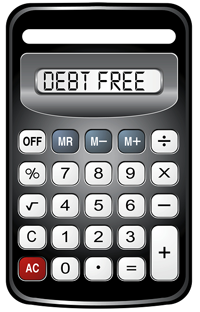Frequently Asked Questions About Bankruptcy

 What is bankruptcy and what does it do?
What is bankruptcy and what does it do?
You want three things when you file for bankruptcy. You want immediate protection from your creditors, debt relief or tax relief, and to keep as much of your money and property as you can under bankruptcy or state law. One of the most powerful steps that you can take to keep your property and eliminate debt is to file a
Chapter 7, 13, 11, or 12 bankruptcy case.
Learn More about types of bankruptcy
 Will bankruptcy protect me from my creditors?
Will bankruptcy protect me from my creditors?
The moment you file your bankruptcy case it immediately stops your creditors from taking any action against you or your property. This is called the "Automatic Stay". Depending on the urgency of your situation, a bankruptcy case can be filed quickly to stop lawsuits, foreclosures, repossessions, garnishments, attachments, levies or seizures of your property or business assets that are at risk.
Learn More about eliminating debts and stopping lawsuits
 Will bankruptcy give me debt relief and tax relief?
Will bankruptcy give me debt relief and tax relief?
Under the bankruptcy laws you may discharge most if not all of your debts. Debts that you may not be able to eliminate are student loans, debts incurred by fraud or other wrongful acts, child and spousal support and division of assets arising out of a divorce. Most, but not all, local, state and federal taxes cannot be discharged. However, there are exceptions to most of these rules that may allow you to discharge the debt or tax.
Learn More about debt relief and tax relief
 Will I be able to keep my property?
Will I be able to keep my property?
Yes, although there are limits on what and how much property you can keep. You may keep your property to the extent that is allowed under either bankruptcy or state law. This is commonly known as an "exemption".
Exemptions protect your property from seizure by your creditors and from bankruptcy trustees. Chapter 7 and 13 debtors usually keep most if not all of their property in bankruptcy.
 What are secured and unsecured debts?
What are secured and unsecured debts?
 You have a secured loan if you gave your lender the right to foreclose, repossess or seize your property or business assets when you don't pay the loan (such as a mortgage or car loan). A debt may also become secured when a creditor gets an attachment or judicial or tax lien on your property. All other debts are unsecured.
You have a secured loan if you gave your lender the right to foreclose, repossess or seize your property or business assets when you don't pay the loan (such as a mortgage or car loan). A debt may also become secured when a creditor gets an attachment or judicial or tax lien on your property. All other debts are unsecured.
If you want to keep the property that secures your loan you usually have to pay the debt. Although, under the right circumstances you can reduce or eliminate the debt entirely. For example, if you have a second mortgage on your residence your bankruptcy attorney may be able to eliminate it.
Learn More about car, boat, asset and business loans
It is critical for you and your bankruptcy attorney to quickly determine how you are going to best use your limited income, savings and other resources. It may be best to pay the bills that are the most important to you, regardless of which creditor harasses and threatens you the most.
Learn More about bankruptcy alternatives
 How will bankruptcy affect my spouse?
How will bankruptcy affect my spouse?
Spouses may file a bankruptcy case jointly. Or, only one of the spouses may choose to file for bankruptcy while the other does not. To file a joint petition you and your spouse must be legally married on the date that the case is filed in the Bankruptcy Court. It is important that you and your bankruptcy attorney discuss the pros and cons of whether you and your spouse should jointly file bankruptcy.
Chapter 7 is the most common type of bankruptcy that is filed by individuals in Massachusetts and New Hampshire. Most likely you will file a Chapter 7 case if you qualify under the Means Test. Under Chapter 7 you can discharge most if not all of your unsecured debts. You may even be able to reduce or eliminate secured debts and unpaid state and federal income taxes. Our clients usually keep most if not all of their property in a Chapter 7 case.
Learn More about Chapter 7
Chapter 13 is also used to eliminate debts and taxes. It is the second most common bankruptcy case filed each year in Massachusetts and New Hampshire. Chapter 13 gives you all of the protections of a Chapter 7 case and more. It is often used to keep homes from foreclosure and other property that may otherwise be lost. Payments under a Chapter 13 plan are often a small percentage of the money that you owe to your unsecured creditors. Our clients usually keep most if not all of their property in a Chapter 13 case.
Learn More about Chapter 13
Usually, yes. First, we must determine how the Means Test may affect you. The Means Test is used to determine if you have enough income to pay a portion of your debts to your creditors. If your recent income is less than the median income in
your state for the same size household, you may file a Chapter 7 case under the Means Test.
If your income exceeds the median income you still may qualify to file a Chapter 7 case. Many people make a hasty decision that they cannot file a Chapter 7 case merely because they had income that was greater than the median income. Do not fall into this trap. Most of our clients qualify to file chapter 7 under the Means Test.
Learn More about the types of Bankruptcy
 How do I choose a bankruptcy lawyer?
How do I choose a bankruptcy lawyer?
Carefully. The interview is crucial in determining whom you hire. What you are looking to get out of an interview is information about a specific lawyer's bankruptcy experience, expertise, services and fees, and that you and your lawyer will work well together. Price is not a reliable basis on which to choose your bankruptcy lawyer. You should also keep in mind that no lawyer can guarantee results.
Learn More about choosing a bankruptcy lawyer
There are number of ways that you can deal with harassing telephone calls. You can take the obvious step of having your answering machine screen all telephone calls. There is no law that says you must talk to your creditors. The next step would be to tell your creditors in writing to stop calling you. Once you tell a creditor to stop calling, they must stop. However, many do not.
Once you retain us, all creditor calls should stop immediately.

